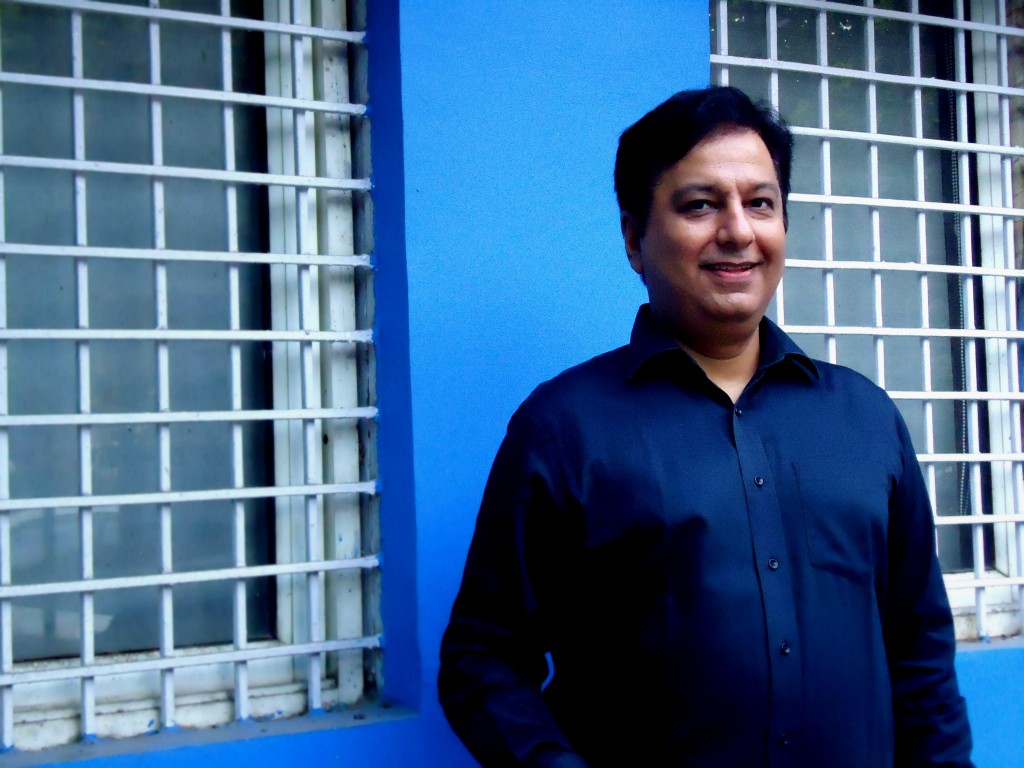The Yellow Sparrow recently got in touch with Vivek Mansukhani, the well known theater actor, director and producer. He made his on-screen debut in the film “In Othello”, and has acting credits in productions such as “Bravely Fought The Queen”, “Art Tara”, and a cameo in “Dil Dosti etc”. He has performed in Amsterdam, London, Cairo, Taipei and other places, conducted workshops in theater for schools, colleges and media institutions. He has a Bachelors in Commerce and CA degree, and is currently working with the British council as Director Arts for India. Follow up on our exclusive interview of him!
Q. Did you start as a director?
A. I started as a theater actor. I acted in my first production. Then after a couple of years experience, I started directing and producing as well. Since it was my own theater company, I had to do everything – from putting in the capital to raising funds to organizing everything. Unfortunately, theater alone couldn’t make a living, so after college I had to decide what I wanted as a day job. I didn’t want to work in Finance, therefore I joined the British Council, where I managed their scholarship programs. Ten years later, I joined the Ford Foundation where I did the same.
My night job/parallel career has always been in theater, though. I’ve been doing theater non-stop for the past 25 years. I’ve been acting, directing and writing scripts. I work with children and adults all the time. I work with other theater companies, write for them, direct for them, direct corporate shows and product launches. I’ve been conducting theater workshops for schools, colleges and media institutions like NDTV etc.
Q. What triggered you to start up?
A. When I was in college, I decided that I did not want to continue studying finance. I wanted to do something in the field of Arts & Culture. I was barely 18 when I started a theater company called “Scene Stealers”, which is now more than 25 years old. All my friends from college and I got together and kicked off a brand new production called “Shut your eyes and think of England”, a British comedy. It was a huge hit. And ever since then, my interest in theater has really taken off.

Q. What is the most gratifying thing about theater and acting in general?
A. Creating anything on stage is a long process.. The enjoyment that you have in thinking about it, staging it in your mind, creating it, putting in new artistic sensibility together and working with new people – it is almost like giving birth to a baby.
Putting up a theater production is much different from making a movie in which you come, you do your scene and you go back. In contrast, those involved in a theater production are like a tight family.
Theater teaches you to how deal with different situations. Most of my close friends are from the theater industry.
Also, It’s almost like running a mini industry in itself. Be it a small or a large play, you feel very responsible. Therefore, it teaches you a lot of leadership skills and working as a team at the same time. It teaches you to be both humble and bossy. It teaches you how to manage your resources. It teaches you to be creative and inventive. It basically teaches you every possible life skill you require. It is possibly the most gratifying thing about theater.
“Theater is more embryonic. You evolve with it. Drama on stage is like a slice of life.”
Q. Can you explain an anecdote that could explain the hardships you might have faced?
A. You have to apply for a lot government clearances to be able to do a show. Often, it doesn’t come through in time. I remember, 10 years ago, I had directed and acted in this wonderful production called Art at Kamani. The show was supposed to start at 7 in the evening and I was sitting at the entertainment tax office till 4 PM trying to get all the clearances and permissions. We had worked extremely hard for this play but the way things were going at that time, I didn’t know if we could really do that play. I thought that the clearances were not going to come through, but luckily they did at around 5 PM. I had to rush to the auditorium, check if everything was fine and go on stage.
This anecdote illustrates how a being a director, producer and an actor is not a cake walk. You have to deal with an environment around you which is not very conducive to producing a play. The sector here is not very organized like it is in the West where so many bodies are ready to help you. You have to put in your money to put the show together. Sometimes, tickets don’t sell, and we end up losing money. But when you put together this level of creativity, you are ready to face these hardships and more.
Q. Did you have to convince your family? If yes, was it easy?
A. I am from a conservative middle class family in Calcutta. They thought that I should be more focused towards my studies and getting a decent job. But in my case, I didn’t give up my day job for theater. Often they saw that I had to invest my own funds into the productions. Had I given up my day job for theater, I would have been at risk. But now that I’ve made a name for myself and I travel internationally very often, they don’t have any issues anymore.
Q. What kind of challenges did you face?
A. Theater is not so developed in India. There are very few good theaters where one can perform. It is very difficult to get sponsors to support theater. Since we all have jobs, actors can’t commit full time. They often end up leaving a week before the show which pretty horrifying; But, we have to manage.
Q. How did you overcome those challenges?
A. I lead by example. Plus when you’re really passionate about something, you work day and night to make it successful. Personally, I have never compromised on the quality of the production even if I am short of funds. I make sure that the production is very good and my audience has a good time.
Q. Did your initial plan fail at any point? How easy was it to change your plan of action?
A. I’ve never really abandoned any of my plans. We’ve always had ups and downs. But we’ve gone ahead and still delivered. I’ve never given up.
Q. What’s the one experience that defines your journey?
A. I was acting in a play called Othello, in black and white, which was performed on an international level. We won a lot of awards for it. People praised our work and were amazed that Indians could speak English (and that too so fluently). You could be a small theater company, but realizing the fact that you can reach out to so many people and connect with them at once was a defining moment.
One other moment that really defines my journey was when I was directing a play for school children. Their parents didn’t see them on stage, but they noticed a change in their children after the whole rehearsal process.
Q. What are the five industry lessons that you could give our readers?
A. -Actors: Practice, Practice, Practice! Know your character well. Do a lot of in-depth study. Even if you have a small role, you can really make an impact. You don’t need a big role and ten million lines to make an impact.
-Directors: Find scripts that have some social relevance. They could be entertaining, but don’t use mindless things. Create something new and exciting. Understand your audience.
-Producers: Don’t wake up at the last minute. Prepare. Plan. Budget. Start working on sponsors, partners and resources in advance. Don’t compromise on your production value due to lack of sponsors.
-Audience: Be respectful of the actors and the arts in general. Switch your phone off in a play. Don’t ask for a free pass every time. If you can pay for a movie, you can pay for a play.
“Having two jobs is not easy but the fact that I am doing what I love is what keeps me going.”
My job is such that I get to meet new people from India and from the UK. It is said to be a very coveted job, therefore it is an achievement for me. I have been running Scene Stealers for more than 25 years, and along the way I have made friends who will last me a lifetime. My night job, i.e Theater has really helped me find myself. It has also taught me a lot about others.












